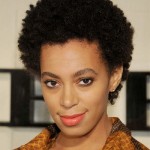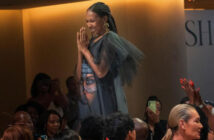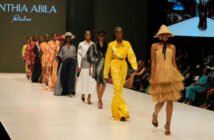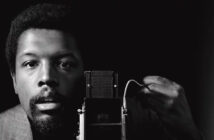 A great number of Africans and black women worldwide use different kinds of chemicals to keep their hair curly or straight instead of nappy and kinky (natural). Black women’s hair has been generating a lot of discussions since the release of Chris Rock’s 2009 documentary, “Good Hair” and the past few years have seen a growing movement that calls on Black women to get back to being “Natural”.
A great number of Africans and black women worldwide use different kinds of chemicals to keep their hair curly or straight instead of nappy and kinky (natural). Black women’s hair has been generating a lot of discussions since the release of Chris Rock’s 2009 documentary, “Good Hair” and the past few years have seen a growing movement that calls on Black women to get back to being “Natural”.
According to this report, despite economic hardships, fake hair is an estimated $6 Billion industry in Africa. This amount of money is peanuts compared to what African-American women in the USA spend on their hair. The report noted that over half of the entire national purchasing power of black women in the USA is being spent on personal grooming products.
At the Toronto Black Film Festival (TBFF) held last February, a panel was set-up to discuss the socio-political, historical and cultural significance of the Black hair. The panel gathered women from both sides of the divide for a comprehensive talk on the subject. ARM’s Akin T. George recently met with two of the panel members to touch base on issues that were raised at during discussion.
ANYA GRANT, Founder and Creative Director of I Heart My Hair:
Añya Grant is a Blogger/ V-blogger/Event Producer/ Educator and Creative Director. Nestled in a hipster Toronto area with her laptop, camera and smartphone Añya conveys her love affair, (some call it an obsession), with Natural Hair as she combines her own hair experience, trending topics and hair mishaps for the world to see on iHeartMyHair.com. Añya’s articles, tutorials and witty activism has been featured in publications such as Naturally Curly, Curly Nikki, Keeping It Kinky and Those Girls Are Wild. Añya has heated things up internationally blessing Jamaica, Brazil and the United States with her fun and interactive hair and self-esteem workshops. To learn more about Ms. Grant please visit iHeartMyHair.com. Follow on: Instagram, Youtube and Tumblr @iHeartMyHair6.
MASANI MONTAGUE, BA (Hons), MES, Founder and Coordinator of RastaFest:
Masani Montague is a playwright, director, journalist, novelist and researcher. She has written, directed and produced several radio plays and stage plays, namely, Up On Eglinton, Breakout, Soundclash, Swarming, Reasoning With My Sisters, Danger to the Public and A Night to Remember. She is the author of the novel, Dread Culture. She holds a diploma in Journalism from Humber College and two degrees from York University; a BA (Hons.) in Creative Writing and a MES degree in Environmental Studies. She is currently completing her Master’s degree in Education at York University. She is the executive director of Upfront Theatre Foundation and the festival coordinator of the annual arts and culture festivals, Rastafest and Sistahfest. Shehas received several awards includingthe Queen’s Diamond Jubilee Medal and the York West Award.
Could you describe what this panel discussion is about
Añya: Natural or not that is the question that this panel discussion addressed from talking about the stigmas of Black hair to the politics of Black hair and to identify root issues that has crippled so many women from wearing their hair’s natural hair texture. Racism is a hell of a thing and has been the main ingredient for creating discriminatory words that has left black women feeling less desired if they did not straighten the kinks. Still to this day there are women and young girls who are constantly being told to straighten their hair due to their workplace and school’s dress codes. This panel offers a Canadian perspective to find solutions to these unrealistic standards of beauty.
Masami: Because I’m dreadlocked, I spoke about what I went through with somebody with locks, because I’ve been using locks since 1977, I came from Jamaica in 74 and got locks in 77, as student in Toronto from 1977 to 1980 I had locks but it was covered all the time, they thought I was bald because they couldn’t see my hair, it was strange and weird. I went through that and after graduation I had a choice to look for a job or to employ myself. At that time I thought nobody is going to employ me and that’s why I created Masami productions.
What necessitate the need for this discussion?
Añya: There is a deep rooted need for this discussion to take place due to the Western ideals of beauty and the lack of diverse beauty represented in the media (TV, Print, Movies and Music videos). We don’t all look like Barbie and therefore our media needs to be reflective of real beauty. The need, I think was to find what natural hair means to participants
Masami: It is a matter of identity because at the panel we have people talking about what natural hair means to them as a black woman. People see it as forms of cultural identity whether it is the Afro, the locks, or the plain natural hair. The panel gave lot of participants opportunity to express what natural hair mean to them.
Does this need arise from personal experience or from societal trends?
Añya: This need to eradicate and fight to eliminate discrimination and biases base on the way someone or a group of people choose to wear their hair goes beyond trends. A societal trend come and goes. I strongly believe the effect of millions of shared personal experiences of women is the desired need to have events and discussions as such to bring about change.
Masami: For me it was from a cultural/religious experience
In the short and long terms, what do you aim to achieve with this discussion?
Añya: Short term goal is to start an open and honest dialogue that will set the path to open long term change, a change where Black women can go to work with a new hairstyle and not be asked “is your hair real”, or “can I touch it” or “you would look so much better with straight hair”. The long term goal is to continue to uplift women to embrace their natural hair texture for themselves. To instill confidence for women with Afrocentric hair (wavy, curly, kinky) can walk down any given neighbourhood, city or country and won’t be looked upon as different, or strange due to their curl, locked or afro hair texture.
Masami: I think it’s about generating discussion around cultural identity, right, and I think the aim of the panel was to get people talking about their identity, usually when you have natural hair it will always generate a lot of discussion. The panel discussion open a lot of other discussions, people are talking about stereotypes, identity, race and how people see in terms of misconception. The short it allow us to generate discussion about all these issues.
Is there any related program or initiative behind this discussion?
Añya: Well I’ll of course highlight my initiative as the Creative Director for iheartmyhair.com a website that acts as a guide for lazy and busy women with textured hair so they don’t fall into the cracks of being a slave to weaves, wigs or chemical process. I’d also like to highlight a program by the Children’s Aid for boys and girls in care called — Beautiful Hair Beautiful Me.
No I have no program related to hair, although I’ll be interested to do a documentary about hair because again, the hair discussion was so alive that it just warrant a documentary, but then I don’t know, there have been several documentary out there and I don’t think we need another documentary.
How would you define Black or Natural hair?
Añya: I’d define Natural Hair as hair that has not been chemically altered or processed. If water can run through the hair and the texture is fairly the same, then that head of hair is considered Natural Hair. Some may argue that dyed Natural Hair is not considered Natural. However I differ I consider chemically dyed hair to be Natural Hair as well.
Masami: Natural hair for me is anything that is not straightened, pressed, weave-on, you know, you talking about Afro, locks, kinky hair (not processed). Braids of course can be considered natural hair.
What are the benefits of going natural, from a female perspective?
Añya: The benefit is to develop a closer bond to oneself. I find it absolutely fascinating how connected to oneself new naturals become when they start to embrace and explore their natural hair texture. Base on my personal experience I had to do a lot of self-talk and looking in the mirror and tell myself “You Are Beautiful”. My confidence exuded and people around me felt the new me and were either attracted to me or retreated from me. Going natural is going on a journey with oneself and it’s a roller coaster ride that is so worth the ups and downs. Not to mention the benefits to our health, eliminating harsh and cancer causing agents such as ammonium thioglycolate form our blood stream is an added bonus.
By being natural, (if the transition is complete before it’s too late) can save thinning hairline and thinning crown, alopecia, hair loss, hair breakage all of which causes thousands of women to fall into depression and result in a decline in self-confidence. Eliminating all these possibilities are benefits from a female perspective for why a fellow female may go-au-naturel.
Masami: As black people, we don’t have straight hair, we have kinky hair, by nature we are born with kinky here and it’s something we should be proud of. When we start putting things in it to process it then it became unnatural. But if you’re born with a straight hair, like coming from a mix-race, it’s a different story, and then it’s natural. The issue is the chemical that you put in your hair that makes it different. I think we should be proud of what we are born with.
Where do you see the trend, are people going artificial or natural
Masami: What I think the young people are doing, I believe they are influenced by the Pop culture. So you’re talking about the Beyoncé and Rihanna. So young people now like even teen-agers don’t want natural hair because of who they are influence by. It is kinda sad because I grew up in the 70s during the afro era.
Where do we draw the line between a natural, treated and artificial hair
Añya: I believe the line can be drawn when women become slaves to their hair/ appearance, to the point they can’t leave the home without having her edges laid or rocking a wig. Same concept with makeup, we as women or teenage girls need to get to the point where it’s ok to grocery shop or drive to the post office or attend a meeting or class with no makeup with our natural hair out.
Masami: You know, it’s a personal choice. It’s not for me to whether somebody should be natural or artificial. I think it’s a personal choice and my personal choice is locks, but I have a fifteen year old daughter that choose to going on braids.
How can a woman of colour make the most of her natural hair without being labelled as being anti-social or an angry black woman?
Añya: Oh! Boy! I really hope people do not have these types of stereotypes when it comes to Natural Hair and towards women period! The best way a woman of colour can make the most of her natural hair is to find a staple hairstyle that she can upkeep easily at home or by going to the salon. She should also feel comfortable and relaxed when rocking her natural hair. So if a black woman decided to get kinky twists with extensions and they were done really tight to the point where she is unable to smile and be uncomfortable then that’s not a style to wear all the time. Another way to make the best of natural hair is for black women to embrace their own hair texture and to wear hairstyles that will enhance the beauty of their hair.
Masami: It depends on where you were or work, some women have no choice, like if you work in the establishment they expect you to have long straight hair to fit in, it’s kind of unfortunate because they are not allowed their choice.
Which one would you consider as the most natural – dreadlocks or just plain black hair?
Añya: They are both considered natural hair but if I absolutely had to choose it would be free form dreadlocks meaning having absolutely no manipulation of the hair. No combs, no products, no styling, just simply cleanse the hair and just let it be, as it grows the hair clumps together and locks on its own time in varied form.
In our fast moving internet age, how would you convince a young girl growing up with images of Beyonce, Rihanna and Oprah to accept natural hair as the best alternative?
Añya: I’d do a field day with her, take her to the salon and educate her as to how much it cost to look like a celebrity and place emphasis on the amount of professionals that make Beyonce, RiRi and Oprah’s glam. I would then ask her why look like someone else when you’re own beauty is unique. Next I would show her how crazy simple and easy it is to take care and style her own hair. I’d also create a hair vision board with her, as we go through magazines (can’t find any images there) then we’d draw a collage of women with similar hair texture and place inspirational quotes and hang the board in her room so she is reminded of her definition of beauty and worth every day.
Masami: I think it should probably start with teaching them from young, for example I see parents straightening 5 – 6 year old girls and that is too much. So it starts from the parents especially the mother. I think it is wrong for parents to start indoctrinating their child so early, they should give them a chance till like they are 13 or 14 years. When they reach that age they can make their own choice.
Where or who can a young woman of colour turn to for her natural hair inspiration?
Añya: Of course I am going to recommend my website – iheartmyhair.com. Another great resource is naturallycurly.com. I would also suggest watching YouTube channels, it is important to watch channels of women who have the same or similar hair texture as you do, so that it’s easier for you to get a better idea as to which product and technique may work well for your hair. My YouTube channel is – youtube.com/iheartmyhair6.






